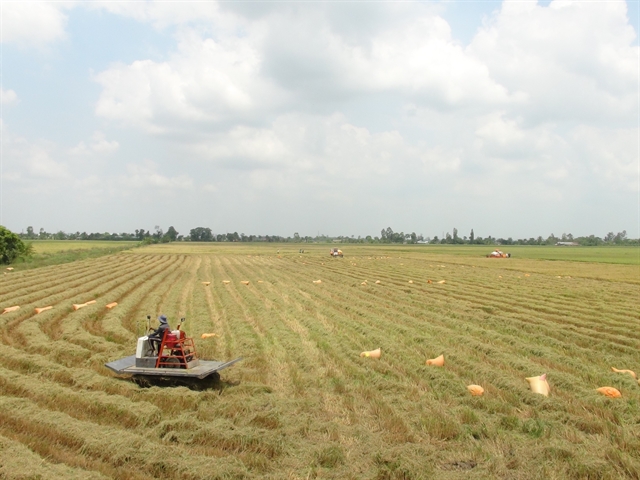 Society
Society

The Cửu Long (Mekong) Delta province of Sóc Trăng has efficiently implemented support policies meant to lift its ethnic Khmer people out of poverty and improve their lives.

|
| Farmers harvest the 2019 summer- autumn rice crop in Sóc Trăng Province. – VNA/VNS Photo Chanh Đa |
SÓC TRĂNG — The Cửu Long (Mekong) Delta province of Sóc Trăng has efficiently implemented support policies meant to lift its ethnic Khmer people out of poverty and improve their lives.
The policies, both central and local, include Programme 135 on socio-economic development of the most vulnerable communes in ethnic minority and mountainous areas, Programme 134 providing free agricultural and residential lands and housing and water connection for disadvantaged ethnic households and Programme 167 on housing support for poor households.
Under Programme 135, for instance, Sóc Trăng has undertaken 162 projects related to rural transport, education, irrigation, and culture in especially difficult communes in 2016-19. They cost VNĐ158.5 billion (US$6.8 million), which was provided by the Government, according to local authorities.
It also spent VNĐ51.8 billion ($2.2 million) under the programme to support production, diversify livelihoods and expand sustainable poverty reduction models, benefiting 4,035 ethnic, mostly Khmer households.
They were provided with seedlings and agricultural production tools and taught farming techniques to improve the quality of their produce.
The households have adopted many efficient models like shrimp – rice and fish – rice farming, raising dairy cattle and growing mushrooms.
The province has more than 400,000 Khmers, the largest number in the country, who account for more than 30 per cent of its population.
Lâm Thị Sươl, a Khmer who grows red onions in Đại Bái Hamlet in Vĩnh Châu Town, said her family used to lack money and be ignorant of farming techniques.
With authorities providing financial support and new farming techniques, its situation has greatly improved, she said.
“Besides my family, other Khmer households in the hamlet too have escaped poverty.”
In Thạnh Trị District, where more than 34 per cent of the population are Khmers, farmers have been taught advanced farming techniques.
Khmer farmers have also established co-operative groups to secure outlets for their produce.
The district has 325 co-operative groups and nearly 50 per cent of their members are Khmers.
Support policies for ethnic people have been implemented well in the district and the money is used properly by beneficiaries, according to the district People’s Committee.
Sơn Sóc Hiên, a man well regarded in the Khmer community in Thạnh Trị’s Thạnh Tân Commune, said besides uplifting the Khmers socio-economically, the province has also helped preserve and develop their culture.
Their festivals are organised every year and their traditions are respected, he said.
Lâm Sách, head of the province’s Ethnic Minority Affairs Board, said dozens of thousands of Khmer families have been provided with houses, farming land, financial assistance for production, seedlings, breeding animals, and jobs and trained in vocational skills.
With the official support, the material and spiritual lives of the ethnic people have improved significantly, he said.
The poverty rate among the Khmers is reducing by 3 – 4 percentage points a year, according to the board.
The province had 13,013 poor Khmer households at the end of last year for a 12.9 per cent poverty rate. — VNS




